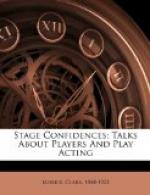The company had come from Cleveland, and there were the usual slight delays attendant on a first night; but the house was “good”; the star (Mr. Buchanan) was making a fine impression, and the play was evidently a “go.” The big picture was looked forward to eagerly, and when it was arranged, we had to admit that the pale, pinched little face of the strange child was more effective as it rested on the dog’s shoulder than had been the plump, smiling face of the manager’s little one. The curtain went up, the applause followed; those behind the scenes crowded to the “wings” to look on; no one noted that the hands of the clock stood at 9.40; no one heard through the second burst of applause the slam of the stage door behind the very, very small person who entered, and silently peering this way and that, found her stern, avenging way to the stage, and that too-favoured sister basking in the sunlight of public approval.
The grandsire had just lifted his head and was about to deliver his beautiful speech of trust and hope, when he was stricken helpless by the entrance upon the stage of a boldly advancing small person of most amazing appearance. Her thin little legs emerged from the shortest of skirts, while her small body was well pinned up in a great blanket shawl, the point of which trailed fully a quarter of a yard on the floor behind her. She wore a woman’s hood on her head, and from its cavernous depth, where there gleamed a pale, malignant small face, a voice issued—the far-reaching voice of a child—that triumphantly commanded:—
“You, Mary Ann, yu’re ter get up out of that an’ com’ home straight away—an’ yu’re ter go ter bed, too,—mother says so!” and the small Nemesis turned on her heel and trailed off the stage, followed by laughter that seemed fairly to shake the building. Nor was that all. No sooner had Mary Ann grasped the full meaning of this dread message than she turned over on her face, and scrambling up by all fours, she eluded the restraining hands of the actress-mother and made a hasty exit to perfect shrieks of laughter and storms of applause; while the climax was only reached when the dog, trained to lie still so long as the pressure of the child’s head was upon his shoulder, finding himself free, rose, shook himself violently, and trotted off, waving his tail pleasantly as he went.
That finished it; the curtain had to fall, a short overture was played, and the curtain rose again without the complete tableau, and the action of the play was resumed; but several times the laughter was renewed. It was only necessary for some person to titter over the ludicrous recollection, and instantly the house was laughing with that person. The next night the manager’s child, swathed in flannel, with a mouth full of cough-drops, held the well-trained dog in his place until the proper moment for him to rise, and the play went on its way rejoicing.
And just to show how long-lasting is the association of ideas, I will state that years, many years afterward, I met a gentleman who had been in the auditorium that night, and he told me he had never since seen a blanket shawl, whether in store for sale or on some broad back, that he had not instantly laughed outright, always seeing poor Mary Ann’s obedient exit after that vengeful small sister with her trailing shawl.




